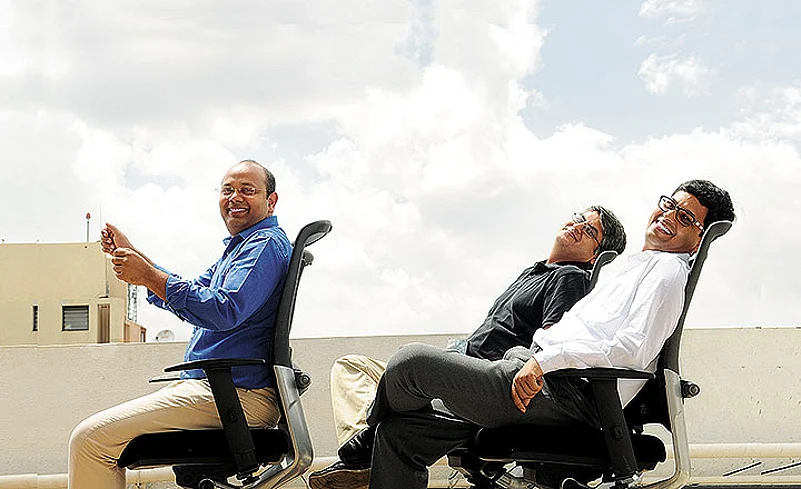IT professional Supriya Singh walks down the same dingy lane at 3 a.m. every night, right down the road from where the office cab drops her off. “I am forced to walk down the empty road on my own. At times, my father has to come pick me up. You know how unsafe Delhi is at night,” she adds. Software engineer Rahul Khanna’s transport problems at the MNC where he works are along similar lines. Khanna, who stays the closest to his office compared with others in his work circle, often reaches home long after his colleagues. “The cab driver drops everybody else first, since that is convenient for him,” he explains. “But this has become an everyday issue for me. Sometimes, I book a cab and head home on my own.”
Although both these India Inc natives are unhappy with the transport service at their respective workplace, they are well aware of the importance of these cab charters. “Employees definitely need company-provided transportation. We only wish that the service get better,” they aver, while heading to work in their respective cabs. In fact, ensuring efficient employee transportation is one of the major costs for any corporate, big or small. “It is the prime responsibility of every company to provide its employees a comfortable ride to office and back. But most companies are currently struggling to meet the expectations of their employees on this front,” says Mahesh Kumar, a Pune-based cab contractor, as he groups employees of Cognizant India as per their drop locations and sends them on their way.
Even as the Olas and Ubers of the world target the commercial taxi space with a vengeance, the employee transportation sector has not seen as much action. Realising the strength and market value of this space, IIT-BHU batchmates Deepesh Agarwal, Akash Maheshwari and Anuvrata Arora, part of the senior management at Motorola, Microsoft and Amazon, respectively, decided to launch MoveInSync, which aims to provide a cost-effective and safe ecosystem of employee transportation services.
The groundwork for this business was laid way back in 2009 at the Indian School of Business, Hyderabad, and the company today manages employee transportation for a range of companies, including Wipro, HCL, KPMG and Google India. Headquartered in Bengaluru, MoveInSync was created as a simple carpool service and has now grown to become a full-fledged transportation management platform. The company’s transport managers have complete control over its operations, aided in part by the touchscreen devices installed in its cabs, says Agarwal.“In 2011, Google signed up with us. Today, people working at companies in Bengaluru, Hyderabad, Delhi, Gurgaon, Noida, Chennai, Visakhapatnam, Pune, Kolkata, Vadodara, Jaipur and Barmer use the solutions provided by MoveInSync,” he adds.
Agarwal says the idea for the company came after the trio observed the low levels of employee satisfaction when it came to transportation services. “The current system of grouping employees by location involves a lot of guess work from the company’s side and leads to wastage of time and hampered security,” he adds. In addition to optimising routes and reducing costs, the platform tries to bridge the gap between routing, tracking and billing. MoveInSync operates on a transportation solution algorithm that aims to group together employees while significantly reducing the total distance covered.
Companies across the IT, BPO, healthcare, oil and gas and consulting sectors access this algorithm through the company’s app. These companies are thus able to provide reliable pick-up and drop services to their employees, in the process cutting down on costs and reducing travel time through route optimisation. To ensure the safety of female employees traveling at odd hours, the company claims to have developed a safe travel corridor, which is based on data about the employees’ past travel routes and stops. The company uses the same to track employee cab usage records and uses a PIN-based authentication system to verify and track employees, apart from providing automated billing. “The employees’ contact numbers are not shared with the cab drivers: we have enabled a click-to-call option on the app that patches the two through without sharing either of their numbers. Also, we make sure that no matter what the combination, women are never the last one to be dropped,” says Agarwal.
Setting up success
Swapna Gupta, an investment manager with Qualcomm Ventures, which has invested about $3 million in MoveInSync, says, “This is a huge, untapped market. Employee transportation is worth more than $5 billion in India alone and then there are other adjacent segments in logistics.” The company recently also received funding from Saama Capital and Inventus Capital and is in the middle of closing its series B funding round. The founders claim that MoveInSync’s customers stand to save around one-fifth of employee travel time, thus helping increase productivity. “Every taxi driver complies with the optimised map route on his mobile. Our routing algorithms calculate the optimised routes for both cabs and buses, which helps the average company save nearly 20% in travel costs,” adds Agarwal. Explaining the booking process, he adds that new bookings can be made through the company’s website or through its application. The service also includes an alert mechanism that reports any unscheduled vehicle stoppage, employee drop-offs at locations other than their homes, driver over-speeding and delays in employee drop-offs.
“The driver’s version of the app is installed on smartphones inside each company’s cabs. Details of each booking are simultaneously sent to the employees and the driver. Thus, the cab can be tracked in real-time,” explains Agarwal. He adds that the presence of cab aggregators such as Ola and Uber has actually helped customers get comfortable with the technology being employed. “Today, drivers are quite conversant with the use of smartphone apps. In fact, we’ve simplified the entire process by including just two buttons in the app –one that starts the driver’s duty and another that ends it,” he explains. MoveInSync charges its customer companies about #200 per employee per month. Its roster runs the gamut of companies, from those with a workforce of just 250 to those with about 25,000 employees on their rolls. The company also facilitates cab sharing between companies that are keen to test the concept. “There are several companies that have expressed interest in this service. But cab sharing only works out when both parties have their offices on the same tech park premises,” adds Agarwal.
MoveInSync raked in Rs.7 crore in revenue in FY15 and the founders expect this figure to double to Rs.15 crore in FY16. As for the company’s valuation, Gupta of Qualcomm says the company has a marquee list of customers and zero churn, and is a market leader as well as first mover. In addition, the founders have built a SaaS revenue-based business that is growing at 10-20% month-o-month. “MoveInSync has more than 25 enterprise customers and more than 100,000 active users accessing its platform every day. All this adds up to a valuation of about $30 million-40 million,” she says. Samir Kumar, MD, Inventus, says the company has grown three times after the recent round of funding and it doesn’t hurt that the market it services is worth almost $5 billion. “Our bet was always on the team,” adds Kumar. MoveInSync is planning to use its recent fund infusion to open offices in Kochi and Thiruvananthapuram, in addition to the existing ones in Bengaluru, Delhi, Hyderabad and Pune, and expand its sales and engineering teams to enter the logistics segment. The company is looking for an additional $10 million to fuel its next growth phase.
With the recent launch of carpooling services by Meru, Ola and Uber, the consumer segment has come squarely in focus for MoveInSync. “Once this system becomes efficient, we are open to providing carpooling services to customers on the basis of trust and convenience,” says Agarwal. “We feel that shared cabs will emerge as an important means of transportation for India, providing convenience at a low cost and positively impacting the environment by reducing the number of vehicles on the road,” he adds. And although competition will be fierce in this category, Gupta is unfazed. “I like the fact that several players have taken a cue from the market and realised how large the opportunity is in the ridesharing space. This is a sort of validation of the market that MoveInSync is going after,” she says. Explaining the company’s biggest challenge, Agarwal admits that the transportation sector as a whole is not very transparent. “Changing mindsets is a huge issue,” he says. After all, the biggest risk with ridesharing still remains the safety angle. This is one ride MoveInSync will have to plan carefully.



























